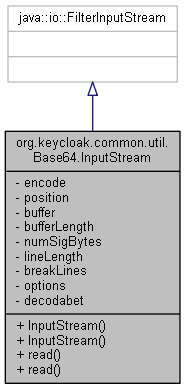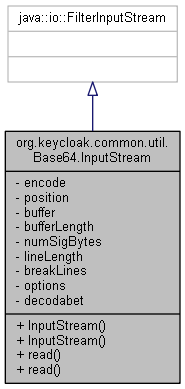org.keycloak.common.util.Base64.InputStream の継承関係図

org.keycloak.common.util.Base64.InputStream 連携図

公開メンバ関数 | |
| InputStream (java.io.InputStream in) | |
| InputStream (java.io.InputStream in, int options) | |
| int | read () throws java.io.IOException |
| int | read (byte[] dest, int off, int len) throws java.io.IOException |
非公開変数類 | |
| boolean | encode |
| int | position |
| byte [] | buffer |
| int | bufferLength |
| int | numSigBytes |
| int | lineLength |
| boolean | breakLines |
| int | options |
| byte [] | decodabet |
詳解
A Base64.InputStream will read data from another java.io.InputStream, given in the constructor, and encode/decode to/from Base64 notation on the fly.
- 参照
- Base64
- から
- 1.3
構築子と解体子
◆ InputStream() [1/2]
|
inline |
Constructs a Base64.InputStream in DECODE mode.
- 引数
-
in the java.io.InputStreamfrom which to read data.
- から
- 1.3
◆ InputStream() [2/2]
|
inline |
Constructs a Base64.InputStream in either ENCODE or DECODE mode.
Valid options:
ENCODE or DECODE: Encode or Decode as data is read. DO_BREAK_LINES: break lines at 76 characters (only meaningful when encoding)
Example: new Base64.InputStream( in, Base64.DECODE )
- 引数
-
in the java.io.InputStreamfrom which to read data.options Specified options
- から
- 2.0
static final int DO_BREAK_LINES
Definition: Base64.java:175
boolean breakLines
Definition: Base64.java:1323
int bufferLength
Definition: Base64.java:1320
static final byte [] getDecodabet(int options)
Definition: Base64.java:430
関数詳解
◆ read() [1/2]
|
inline |
Reads enough of the input stream to convert to/from Base64 and returns the next byte.
- 戻り値
- next byte
- から
- 1.3
encode &&
static int decode4to3(byte[] source, int srcOffset, byte[] destination, int destOffset, int options)
Definition: Base64.java:1030
static byte [] encode3to4(byte[] b4, byte[] threeBytes, int numSigBytes, int options)
Definition: Base64.java:466
boolean breakLines
Definition: Base64.java:1323
int bufferLength
Definition: Base64.java:1320
static final byte WHITE_SPACE_ENC
Definition: Base64.java:214
static final int MAX_LINE_LENGTH
Definition: Base64.java:199
◆ read() [2/2]
|
inline |
Calls read() repeatedly until the end of stream is reached or len bytes are read. Returns number of bytes read into array or -1 if end of stream is encountered.
- 引数
-
dest array to hold values off offset for array len max number of bytes to read into array
- 戻り値
- bytes read into array or -1 if end of stream is encountered.
- から
- 1.3
メンバ詳解
◆ breakLines
|
private |
◆ buffer
|
private |
◆ bufferLength
|
private |
◆ decodabet
|
private |
◆ encode
|
private |
◆ lineLength
|
private |
◆ numSigBytes
|
private |
◆ options
|
private |
◆ position
|
private |
このクラス詳解は次のファイルから抽出されました:
- D:/AppData/doxygen/keycloak/src/keycloak/src/main/java/org/keycloak/common/util/Base64.java
 1.8.13
1.8.13